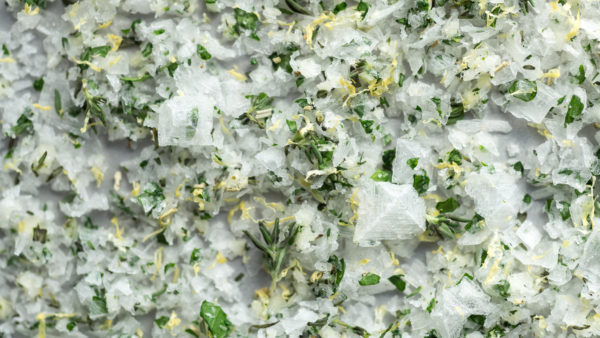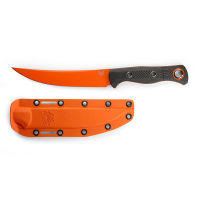
Duration
45 minutes; 15 minutes
Serves
1 gallon; 1/2 cup
The most common complaint I hear about wild game is that it’s tough and dry; a symptom often the result of overcooking. The best way to counterbalance this issue is to start brining your meat. Salt can dramatically enhance juiciness, and in my opinion, is the most essential ingredient in your pantry.
Have you ever considered what makes meat juicy? Two factors contribute to this mouthfeel: fat being released from the fibers as you chew, and water that is naturally present in the tissue.
Juices squeeze out of meat as it cooks. The higher the heat, the more you lose. Since wild game is usually very lean, it’s detrimental to overcook because there’s no fat to make up for the excessive moisture loss. The easiest way to avoid this undesirable situation is to utilize the power of salt.
Salt can react with meat in two very different ways. If you apply a large amount for an extended period, it will draw all the moisture out. We refer to this process as curing, and it aids in preservation. A brine is salt dissolved in water with various herbs and spices in which you submerge meat or inject into meat. It has the opposite effect and increases the amount of moisture in the muscle tissue.
The salt in a brine denatures and relaxes protein structures. This allows the muscle tissue to absorb water from the wet brine. In other words, it helps meat hold more water, which counterbalances moisture loss when heated. I like to think of it as insurance for overcooking. In addition, it tenderizes meat and enhances the natural flavors.
There are two types of brines, wet and dry. A classic, wet brine is the one you are probably most familiar with from preparing Thanksgiving turkeys.
A dry brine is a mixture of salt and other spices without the liquids. In layman’s terms, it’s a dry rub applied to meat.
While technically a dry brine and a cure are the same thing, the main difference is the purpose. Unlike curing, a dry brine uses only enough salt to lightly cover the meat, not encrust it, for one to three days without having to rinse. The primary goal is to infuse foods with moisture and flavor.
Both types of brines are beneficial. A wet brine is perfect for cooking skinless birds or hefty cuts of meat before smoking. A common solution is 3 to 6% salt. My go-to ratio is a quarter of a cup of kosher salt for every four cups of water. You can include sugar to counterbalance the salt and add peppercorns, garlic, or herbs for flavor.
Remember that the longer you brine, the saltier the meat will be. Small birds or game may only need 8 to 12 hours, while turkeys or whole hams benefit from 24 to 48 hours in the refrigerator. Always rinse the meat with cold water before cooking to remove excess salt.
When it comes to cooking plucked birds, it’s easier to achieve crispy skin if you go with a dry brine. The added water from a wet brine pumps liquid into the skin, which can make it rubbery if not thoroughly dried out before cooking. The dry-brine method is also my trick for making the perfect backstrap steak.
Below are two recipes; one is a classic wet brine to use for almost any type of wild game that you plan to braise, roast, or smoke. It is perfect for skinless birds, geese, rabbits, squirrels, bone-in hams, or shoulders from deer or hogs.
The garlic and herb salt is a homemade rub that I frequently use for plucked gamebirds. It’s excellent on pheasant, chukar, quail, and partridge. In fact, I use this rub to season my turkey every Thanksgiving instead of a traditional wet brine. It’s also a smart way to season potatoes and mushrooms.
Ingredients
Classic Brine
- 1 cup kosher salt
- 1 cup sugar
- 1 gallon of water
- 2 tbsp. peppercorns
- 4-6 bay leaves
- 4 – 6 sprigs of fresh herbs
Garlic and Herb Salt
- 1/2 cup kosher salt
- 2 tbsp of mixed fresh herbs such as rosemary, thyme, parsley, or sage
- 2 cloves of garlic, minced
- 1/2 lemon, zested
- 1 tbsp. fresh cracked pepper
Also works with
Special equipment
Preparation
Classic Brine
- Combine all of the ingredients in a large pot. Bring to a boil and stir to dissolve the salt. Remove from heat and let the mixture cool. You can add a little ice to speed up the process.
- Once completely cool, (DO NOT add while warm) pour the brine over the meat in a large, non-reactive bowl. Cover and transfer to the refrigerator for 8 to 48 hours depending on weight of meat.
- Before cooking, rinse the meat with cool water.
Garlic and Herb Salt
- Mince the herbs and garlic as finely as you can. Add to a bowl with the kosher salt, cracked pepper, and lemon zest. Mix well and spread the salt across a sheet tray in a thin layer. Allow to dry out overnight and store in an airtight container. For faster drying time you can place inside a dehydrator on the lowest setting.
- This recipe makes roughly half a cup. When ready to use, season gamebirds over and under the skin with only as much salt as needed to lightly cover. You don’t want to make it so salty that it needs rinsing. Let the seasoned meat rest in the refrigerator for 24 to 48 hours uncovered. Pat the skin very dry before cooking.
Sign In or Create a Free Account
Reviews
The most common complaint I hear about wild game is that it’s tough and dry; a symptom often the result of overcooking. The best way to counterbalance this issue is to start brining your meat. Salt can dramatically enhance juiciness, and in my opinion, is the most essential ingredient in your pantry.
Have you ever considered what makes meat juicy? Two factors contribute to this mouthfeel: fat being released from the fibers as you chew, and water that is naturally present in the tissue.
Juices squeeze out of meat as it cooks. The higher the heat, the more you lose. Since wild game is usually very lean, it’s detrimental to overcook because there’s no fat to make up for the excessive moisture loss. The easiest way to avoid this undesirable situation is to utilize the power of salt.
Salt can react with meat in two very different ways. If you apply a large amount for an extended period, it will draw all the moisture out. We refer to this process as curing, and it aids in preservation. A brine is salt dissolved in water with various herbs and spices in which you submerge meat or inject into meat. It has the opposite effect and increases the amount of moisture in the muscle tissue.
The salt in a brine denatures and relaxes protein structures. This allows the muscle tissue to absorb water from the wet brine. In other words, it helps meat hold more water, which counterbalances moisture loss when heated. I like to think of it as insurance for overcooking. In addition, it tenderizes meat and enhances the natural flavors.
There are two types of brines, wet and dry. A classic, wet brine is the one you are probably most familiar with from preparing Thanksgiving turkeys.
A dry brine is a mixture of salt and other spices without the liquids. In layman’s terms, it’s a dry rub applied to meat.
While technically a dry brine and a cure are the same thing, the main difference is the purpose. Unlike curing, a dry brine uses only enough salt to lightly cover the meat, not encrust it, for one to three days without having to rinse. The primary goal is to infuse foods with moisture and flavor.
Both types of brines are beneficial. A wet brine is perfect for cooking skinless birds or hefty cuts of meat before smoking. A common solution is 3 to 6% salt. My go-to ratio is a quarter of a cup of kosher salt for every four cups of water. You can include sugar to counterbalance the salt and add peppercorns, garlic, or herbs for flavor.
Remember that the longer you brine, the saltier the meat will be. Small birds or game may only need 8 to 12 hours, while turkeys or whole hams benefit from 24 to 48 hours in the refrigerator. Always rinse the meat with cold water before cooking to remove excess salt.
When it comes to cooking plucked birds, it’s easier to achieve crispy skin if you go with a dry brine. The added water from a wet brine pumps liquid into the skin, which can make it rubbery if not thoroughly dried out before cooking. The dry-brine method is also my trick for making the perfect backstrap steak.
Below are two recipes; one is a classic wet brine to use for almost any type of wild game that you plan to braise, roast, or smoke. It is perfect for skinless birds, geese, rabbits, squirrels, bone-in hams, or shoulders from deer or hogs.
The garlic and herb salt is a homemade rub that I frequently use for plucked gamebirds. It’s excellent on pheasant, chukar, quail, and partridge. In fact, I use this rub to season my turkey every Thanksgiving instead of a traditional wet brine. It’s also a smart way to season potatoes and mushrooms.
Ingredients
Classic Brine
- 1 cup kosher salt
- 1 cup sugar
- 1 gallon of water
- 2 tbsp. peppercorns
- 4-6 bay leaves
- 4 – 6 sprigs of fresh herbs
Garlic and Herb Salt
- 1/2 cup kosher salt
- 2 tbsp of mixed fresh herbs such as rosemary, thyme, parsley, or sage
- 2 cloves of garlic, minced
- 1/2 lemon, zested
- 1 tbsp. fresh cracked pepper
Also works with
Special equipment
Preparation
Classic Brine
- Combine all of the ingredients in a large pot. Bring to a boil and stir to dissolve the salt. Remove from heat and let the mixture cool. You can add a little ice to speed up the process.
- Once completely cool, (DO NOT add while warm) pour the brine over the meat in a large, non-reactive bowl. Cover and transfer to the refrigerator for 8 to 48 hours depending on weight of meat.
- Before cooking, rinse the meat with cool water.
Garlic and Herb Salt
- Mince the herbs and garlic as finely as you can. Add to a bowl with the kosher salt, cracked pepper, and lemon zest. Mix well and spread the salt across a sheet tray in a thin layer. Allow to dry out overnight and store in an airtight container. For faster drying time you can place inside a dehydrator on the lowest setting.
- This recipe makes roughly half a cup. When ready to use, season gamebirds over and under the skin with only as much salt as needed to lightly cover. You don’t want to make it so salty that it needs rinsing. Let the seasoned meat rest in the refrigerator for 24 to 48 hours uncovered. Pat the skin very dry before cooking.







